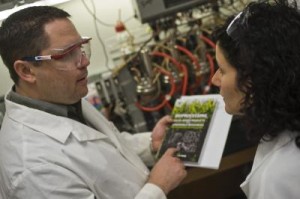Last week, several researchers from Rice University unveiled a new method for converting simple glucose (sugar) into biofuels and petrochemicals 10 times faster than any method previously reported. The research was published in Nature online and details how the team reversed one of the most efficient of all metabolic pathway, the beta oxidation cycle, to engineer bacteria that quickly produce biofuels.
 “That’s really not even a fair comparison because the other organisms used an expensive, enriched feedstock, and we used the cheapest thing you can imagine, just glucose and mineral salts,” said Ramon Gonzalez, associate professor of chemical and biomolecular engineering at Rice and lead co-author of the Nature study.
“That’s really not even a fair comparison because the other organisms used an expensive, enriched feedstock, and we used the cheapest thing you can imagine, just glucose and mineral salts,” said Ramon Gonzalez, associate professor of chemical and biomolecular engineering at Rice and lead co-author of the Nature study.
The bacteria actually create butanol, a fuel that many believe has greater hope than ethanol because of its higher energy content, ability to be transported with current infrastructure and butanol can be used in current vehicles with no modifications.
“We call these ‘drop-in’ fuels and chemicals, because their structure and properties are very similar, sometimes identical, to petroleum-based products,” Gonzalez continued. “That means they can be ‘dropped in,’ or substituted, for products that are produced today by the petrochemical industry.”
 Gonzalez explained that butanol is a relatively short molecule, with just four carbon atoms. Molecules with longer carbon chains have been even more troublesome for biotech producers to make, he said, particularly molecules with chains of 10 or more carbon atoms. That’s because, in part, researchers have focused on ramping up the natural metabolic processes that cells use to build long-chain fatty acids. His team took a different approach.
Gonzalez explained that butanol is a relatively short molecule, with just four carbon atoms. Molecules with longer carbon chains have been even more troublesome for biotech producers to make, he said, particularly molecules with chains of 10 or more carbon atoms. That’s because, in part, researchers have focused on ramping up the natural metabolic processes that cells use to build long-chain fatty acids. His team took a different approach.
“Rather than going with the process nature uses to build fatty acids, we reversed the process that it uses to break them apart,” Gonzalez said. “It’s definitely unconventional, but it makes sense because the routes nature has selected to build fatty acids are very inefficient compared with the reversal of the route it uses to break them apart.” This process both breaks down fatty acids and creates energy.
Gonzalez said they can not only make multiple kinds of specialized molecules for various markets using this method, but they can do this in any organism.

